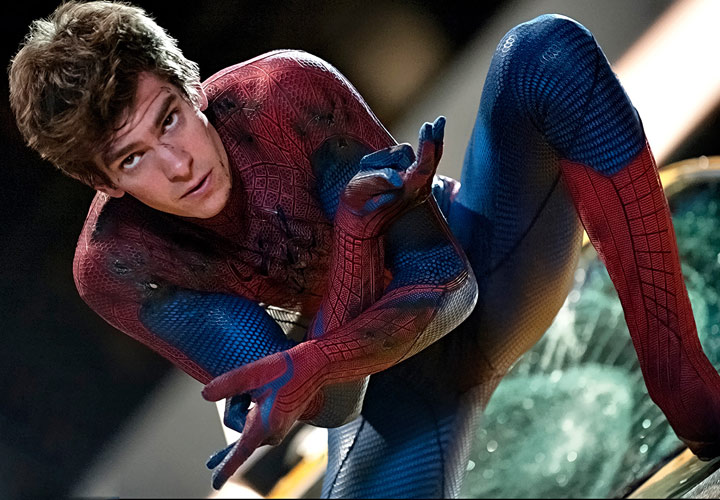Directed by Marc Webb
Written by James Vanderbilt and Alvin Sargent and Steve Kloves
USA, 2012
Here’s a fun game: clear your mind of all memories associated with seeing the Spider-Man trilogy directed by Sam Raimi. How quickly can you do it? Having some trouble wrapping your head around the concept? Who could blame you? It’s only been 5 years since the web-crawling superhero graced the silver screen. Yet already, Columbia Pictures is trying to start anew with The Amazing Spider-Man, a workmanlike but decent reboot that changes a few notes of Peter Parker’s origin story but plays an awfully similar tune.
So, why dip into the Spidey-shaped well so soon after Sam Raimi’s financially successful and somewhat fondly remembered trilogy? Raimi’s series wasn’t without its flaws; specifically, the goofy tone that made the first two films stand out in the superhero genre just about overwhelmed Spider-Man 3. Sadly, any definable, singular tone is absent from The Amazing Spider-Man. With so many superhero films flooding the multiplexes, it becomes more and more vital for those films to have a unique voice. Thankfully, all The Amazing Spider-Man has is an excellent cast, who cover up most of its problems.
Andrew Garfield dons the suit this time, replacing Tobey Maguire as Peter Parker, the awkward New York teenager who gains spider-based superpowers when he’s bit by a radioactive arachnid in a high-tech laboratory. Soon, he’s wearing a red-and-blue suit, fighting criminals under the apt moniker Spider-Man. Of course, with Peter’s great new powers comes…well, a heavy dose of angst. He has to juggle a relationship with the fetching and intelligent Gwen Stacy (Emma Stone); trouble with his surrogate parents, Uncle Ben and Aunt May (Martin Sheen and Sally Field); and a shaky alliance with Dr. Curt Connors (Rhys Ifans), an obsessive scientist who knew Peter’s parents before they mysteriously perished.
Some parts of The Amazing Spider-Man stand out as fresh, simply because they weren’t present in the previous series. For example, Connors, once played by Dylan Baker, has more to do here and Ifans imbues the character with a slightly wounded, soulful air. Ifans has no room to indulge in his playful side but makes Connors’ path to becoming Spider-Man’s first nemesis, the Lizard, feel more natural than the script does. In fact, the whole cast—even Denis Leary, inexplicably cast in a straight-man role as Gwen’s police-captain father—feels right for their roles. The real trouble is the script, by James Vanderbilt, Alvin Sargent, and Steve Kloves, which underserves some of the actors, especially Field. Uncle Ben and Aunt May are so instrumental in defining Peter as a person, in shaping and molding his young mind, so it’s baffling that their roles feel so diminished. Sheen is, typically, a joy to watch, making gold from his meager material, but Field has nothing to do aside from a variation on the concerned housewife and flounders a bit.
That aside, it’s clear that if anyone makes money from The Amazing Spider-Man, if Sony throws a ticker-tape parade in anyone’s honor, it should be casting director Francine Maisler for seeing the palpable and thrilling chemistry between Andrew Garfield and Emma Stone. Their dialogue doesn’t particularly crackle with wit—the lines aren’t bad, but sparkling banter, it’s not. What does sparkle is their physical connection. Any time they’re on screen together is more exciting than the numerous, serviceable action sequences. Knowing that Garfield and Stone have an off-screen relationship makes perfect sense; they’re clearly giddy at the prospect of sharing scenes. What’s more, while Stone is her usual delightful self, she brings out the best in Garfield. He got to be the humane part of The Social Network, despite feeling like a wet blanket. In The Amazing Spider-Man, there are more than a few moments where you get the sense that Garfield relishes the chance to be the hero.
Casting aside, The Amazing Spider-Man is content to be a safe summer blockbuster. Sure, Sony hiring Marc Webb of (500) Days of Summer to direct the beginning of a potentially long-running superhero franchise sounds crazy. Webb, however, doesn’t feel lost behind the camera so much as unwilling to break any new ground. All he does is rely on the same tricks the majority of action-movie directors employ. Many hand-to-hand combat scenes are replete with choppy editing and fast-moving camerawork that obscures the actual action. The strangest problem, though, is the film’s use of 3D. Unlike most 3D releases, The Amazing Spider-Man wasn’t post-converted; it was filmed using 3D camera rigs. You may be shocked, though, if you act upon your curiosity during some non-action scenes and take off your 3D glasses, to find a perfectly clear, completely un-blurry image. The 3D isn’t detrimental, but never feels vital.
Comparing The Amazing Spider-Man to its predecessors is almost impossible, but the less you think about the Sam Raimi trilogy, the more you may find yourself getting into the groove with this version. Forgetting why you liked or loved the 2000s-era take on Peter Parker may be antithetical to revisiting the beloved web-slinger, but it’s for the best. And as fun as this new film can be, you’re better off saving a few bucks and avoiding the 3D presentation altogether. Anchored by Andrew Garfield and Emma Stone, The Amazing Spider-Man is merely a passable restart to a recognizable franchise.
– Josh Spiegel





